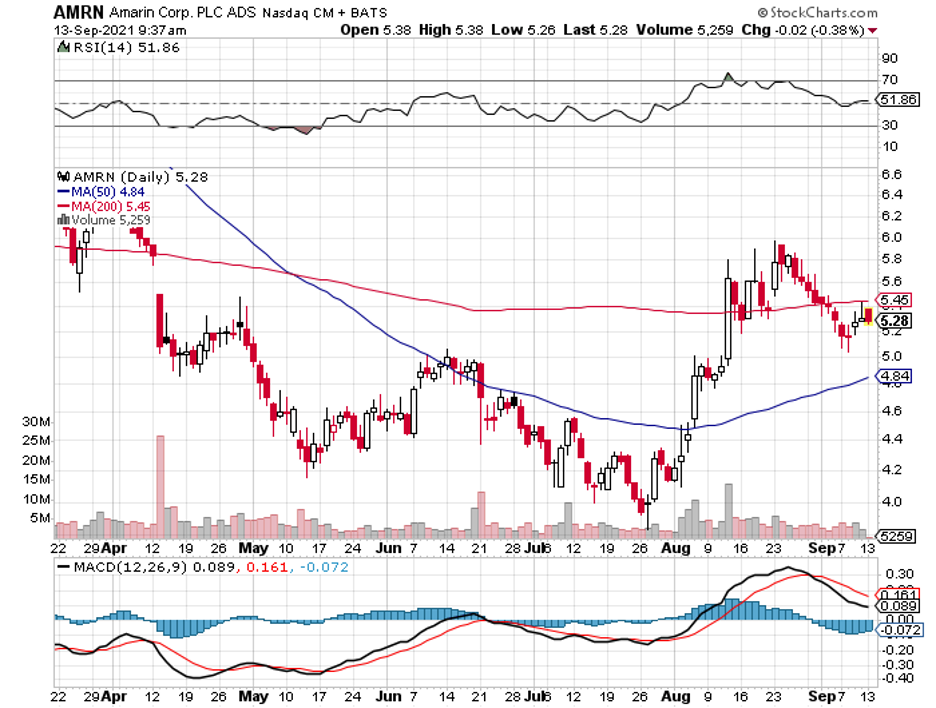Go Global With This Value Pick
Since it bottomed out in March last year, the stock market has been relatively unstoppable.
It took the widely tracked S&P 500 roughly 17 months to practically double its value, exhibiting what could only be described as the strongest rebound from a bear-market bottom throughout history.
But it looks like things are only starting to heat up. Even with the market already hitting new all-time highs, there remain some serious values up for grabs.
One of them is a small-cap company operating in the biotechnology and healthcare sector: Amarin (AMRN).
This biotech’s claim to fame is Vascepa, which can lower the risk of major adverse cardiovascular occurrences by 25% among patients undergoing statin therapy.
Basically, Amarin discovered that controlling cholesterol with statins is not enough to prevent heart disease.
Therefore, it formulated Vascepa to do something more effective: to reduce triglycerides, which is a kind of fat found in your blood.
What makes Vascepa an amazing drug is that it offers us a new understanding of the No. 1 killer among humans.
Based on a Harvard study, Vascepa’s ability to lessen triglycerides has succeeded in reducing strokes, heart attacks, and even deaths.
Right now, Amarin stock is incredibly cheap. There are two possible reasons behind this.
One reason is the COVID-19 pandemic, which triggered lockdowns that consequently hampered sales growth.
Typically, doctors need to be informed of new scientific and medical breakthroughs in their fields. That’s obviously difficult to do amidst lockdowns.
Despite that challenge, Amarin actually still managed to boost its revenue in 2020 by 43%. Considering that the lockdowns have started to ease this year, I anticipate increasing the rate in 2021.
The second reason for the stock’s low price is Amarin’s involvement in legal battles over its patents in the past year.
This problem has opened doors for the likes of Hikma Pharmaceuticals USA Inc. (HKMPF) and Dr. Reddy’s Laboratories (RDY) to offer generic versions of Amarin’s Vascepa in the US market.
As expected, this cast a cloud over the biotech’s growth story and pushed its share price down.
Although Amarin is caught in a tug-of-war between believers and naysayers, I still expect sales of Vascepa to spike in the future.
Regardless of the generic competition in the US, Amarin has retained 89% of the market share in this segment.
Moreover, Amarin’s patents outside the US remain intact. In fact, the European Commission has allowed the company to market the drug in the region.
Amarin’s patent on Vascepa has been extremely well protected in Europe for roughly two decades.
In fact, the company will be launching this blockbuster drug as Vazkepa in Germany and the UK this year—a strong contender as one of the company’s main revenue streams, with 80 million people diagnosed with cardiovascular disease in these regions.
For context, Vazkepa is expected to be sold for $250 in Europe compared to the lower $88 price point in the US, resulting from generic erosion.
Probably stemming from this issue, Amarin has modified its business model to focus more on global expansion.
One area of expansion is in Asia, specifically in China.
What we know so far is that Amarin and its Chinese partner are expected to receive regulatory approval by the end of 2021. When this happens, Vazkepa can then be marketed in mainland China and Hong Kong through commercial partners.
Apart from Europe and Asia, Amarin has also been expanding in other regions, including Canada, the UAE, and Lebanon.
Considering that the market for cardiovascular drugs is projected to reach roughly $92.4 billion this year, it’s not farfetched to say that Vascepa holds a multi-billion-dollar market opportunity.
In short, Amarin holds an approved drug proven to save lives, a massive market opportunity, and a solid competitive moat.
With a market capitalization of a little over $2 billion and priced at roughly $5 per share, Amarin is projected to reach at least $19 in the following months.
That’s a 280% upside awaiting patient investors.



